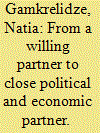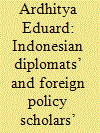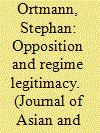|
|
|
Sort Order |
|
|
|
Items / Page
|
|
|
|
|
|
|
| Srl | Item |
| 1 |
ID:
150999


|
|
|
|
|
| Summary/Abstract |
What are the attitudes towards the European Union (EU), the United States, Russia and Japan among Chinese urban citizens, and how can we explain these attitudes? These are the intriguing questions that we want to answer in this article. The image, social identity, trust, and political socialization theories proposed the various explanatory variables. We assessed their explanatory powers by analysing survey data from more than 2000 Chinese urban citizens. Most empirical evidence is found for the image theory: positive perceptions of the people (trustworthy and peaceful) and the bilateral relationship (friendly) clearly contribute to positive attitudes.
|
|
|
|
|
|
|
|
|
|
|
|
|
|
|
|
| 2 |
ID:
184111


|
|
|
|
|
| Summary/Abstract |
This article explores EU political elites' images of Georgia and its evolution from 1991 to 2020. The analysis relies on the author’s 25 original interviews with EU political elites, including presidents, prime ministers and ministers of EU member states and EU commissioners, alongside primary documents. By triangulating between novel interview data, document analysis and statements by EU officials, this article unpacks EU perceptions of Georgia’s intentions, capabilities, threats and cultural status over a 30-year historical period. The study shows that three main images of Georgia have emerged over time in the eyes of EU and EU member states leaders: first, Georgia as a willing partner to the EU; second, Georgia as a political partner to the EU and third, Georgia as a close political and economic partner to the EU. This article, by studying the EU political elites’ images of Georgia, adds knowledge to the EU’s perceptions of external actors, which is an under-researched topic in the scholarship of images and perceptions in EU external relations. Moreover, it extends the literature on EU–Georgia relations, and helps to understand some of their peculiarities.
|
|
|
|
|
|
|
|
|
|
|
|
|
|
|
|
| 3 |
ID:
189249


|
|
|
|
|
| Summary/Abstract |
The question of whether China’s rise to power will be peaceful cannot be evaluated without considering the actions of other major powers. Therefore, this study seeks to explore how Indonesia formulates its response to a rising China. Although previous studies have recognized the importance of perception in shaping Indonesia’s strategic response toward China, previous scholarship has not achieved a systematic investigation of Indonesians’ perception of a rising China. Therefore, this study applies image theory from international relations scholarship to carry out a qualitative content analysis of empirical data collected during interviews with Indonesian diplomats as well as foreign policy scholars. This study finds that perceiving China as presenting a degree of threat rather than opportunity is the dominant perceptual trend among individuals in this study sample. The relatively moderate degree of threats from China were characterized more as economic exploitation and political subordination, than as military attacks or occupation. However, these should be evaluated alongside findings that those individuals are more perceptually sophisticated in their approach to understanding China. This finding therefore suggests, that in the foreseeable future, Indonesian foreign affairs bureaucracy will hardly encourage Jakarta to notably shift Indonesia’s orientation toward the rising power.
|
|
|
|
|
|
|
|
|
|
|
|
|
|
|
|
| 4 |
ID:
093617


|
|
|
|
|
| Publication |
2010.
|
| Summary/Abstract |
This article seeks to understand the changing behavior of oppositional groups during socioeconomic changes using a comparative study of Singapore and Hong Kong. In order to better understand this process, three ideal typical phases are suggested. An almost complete lack of oppositional behavior characterizes the first phase, the 'colonial phase'. Second, the 'localization phase' occurs due to the increasing complexity of the political system and the need to become more responsive to the people. A major legitimacy crisis fundamentally changes the relationship between oppositional groups and the Government. In the 'decolonization phase', oppositional groups become mobilized and form coalitions to demand greater democratization.
|
|
|
|
|
|
|
|
|
|
|
|
|
|
|
|
|
|
|
|
|